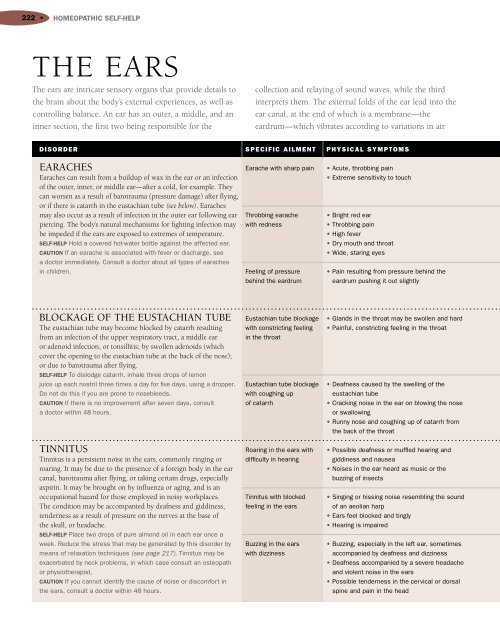Encyclopedia of Homeopathy
Encyclopedia of Homeopathy
Encyclopedia of Homeopathy
Create successful ePaper yourself
Turn your PDF publications into a flip-book with our unique Google optimized e-Paper software.
222 •HOMEOPATHIC SELF-HELPTHE EARSThe ears are intricate sensory organs that provide details tothe brain about the body’s external experiences, as well ascontrolling balance. An ear has an outer, a middle, and aninner section, the first two being responsible for thecollection and relaying <strong>of</strong> sound waves, while the thirdinterprets them. The external folds <strong>of</strong> the ear lead into theear canal, at the end <strong>of</strong> which is a membrane—theeardrum—which vibrates according to variations in airDISORDEREARACHESEaraches can result from a buildup <strong>of</strong> wax in the ear or an infection<strong>of</strong> the outer, inner, or middle ear—after a cold, for example. Theycan worsen as a result <strong>of</strong> barotrauma (pressure damage) after flying,or if there is catarrh in the eustachian tube (see below). Earachesmay also occur as a result <strong>of</strong> infection in the outer ear following earpiercing. The body’s natural mechanisms for fighting infection maybe impeded if the ears are exposed to extremes <strong>of</strong> temperature.SELF-HELP Hold a covered hot-water bottle against the affected ear.CAUTION If an earache is associated with fever or discharge, seea doctor immediately. Consult a doctor about all types <strong>of</strong> earachesin children.SPECIFIC AILMENTEarache with sharp painThrobbing earachewith rednessFeeling <strong>of</strong> pressurebehind the eardrumPHYSICAL SYMPTOMS• Acute, throbbing pain• Extreme sensitivity to touch• Bright red ear• Throbbing pain• High fever• Dry mouth and throat• Wide, staring eyes• Pain resulting from pressure behind theeardrum pushing it out slightlyBLOCKAGE OF THE EUSTACHIAN TUBEThe eustachian tube may become blocked by catarrh resultingfrom an infection <strong>of</strong> the upper respiratory tract, a middle earor adenoid infection, or tonsillitis; by swollen adenoids (whichcover the opening to the eustachian tube at the back <strong>of</strong> the nose);or due to barotrauma after flying.SELF-HELP To dislodge catarrh, inhale three drops <strong>of</strong> lemonjuice up each nostril three times a day for five days, using a dropper.Do not do this if you are prone to nosebleeds.CAUTION If there is no improvement after seven days, consulta doctor within 48 hours.TINNITUSTinnitus is a persistent noise in the ears, commonly ringing orroaring. It may be due to the presence <strong>of</strong> a foreign body in the earcanal, barotrauma after flying, or taking certain drugs, especiallyaspirin. It may be brought on by influenza or aging, and is anoccupational hazard for those employed in noisy workplaces.The condition may be accompanied by deafness and giddiness,tenderness as a result <strong>of</strong> pressure on the nerves at the base <strong>of</strong>the skull, or headache.SELF-HELP Place two drops <strong>of</strong> pure almond oil in each ear once aweek. Reduce the stress that may be generated by this disorder bymeans <strong>of</strong> relaxation techniques (see page 217). Tinnitus may beexacerbated by neck problems, in which case consult an osteopathor physiotherapist.CAUTION If you cannot identify the cause <strong>of</strong> noise or discomfort inthe ears, consult a doctor within 48 hours.Eustachian tube blockagewith constricting feelingin the throatEustachian tube blockagewith coughing up<strong>of</strong> catarrhRoaring in the ears withdifficulty in hearingTinnitus with blockedfeeling in the earsBuzzing in the earswith dizziness• Glands in the throat may be swollen and hard• Painful, constricting feeling in the throat• Deafness caused by the swelling <strong>of</strong> theeustachian tube• Cracking noise in the ear on blowing the noseor swallowing• Runny nose and coughing up <strong>of</strong> catarrh fromthe back <strong>of</strong> the throat• Possible deafness or muffled hearing andgiddiness and nausea• Noises in the ear heard as music or thebuzzing <strong>of</strong> insects• Singing or hissing noise resembling the sound<strong>of</strong> an aeolian harp• Ears feel blocked and tingly• Hearing is impaired• Buzzing, especially in the left ear, sometimesaccompanied by deafness and dizziness• Deafness accompanied by a severe headacheand violent noise in the ears• Possible tenderness in the cervical or dorsalspine and pain in the head
















